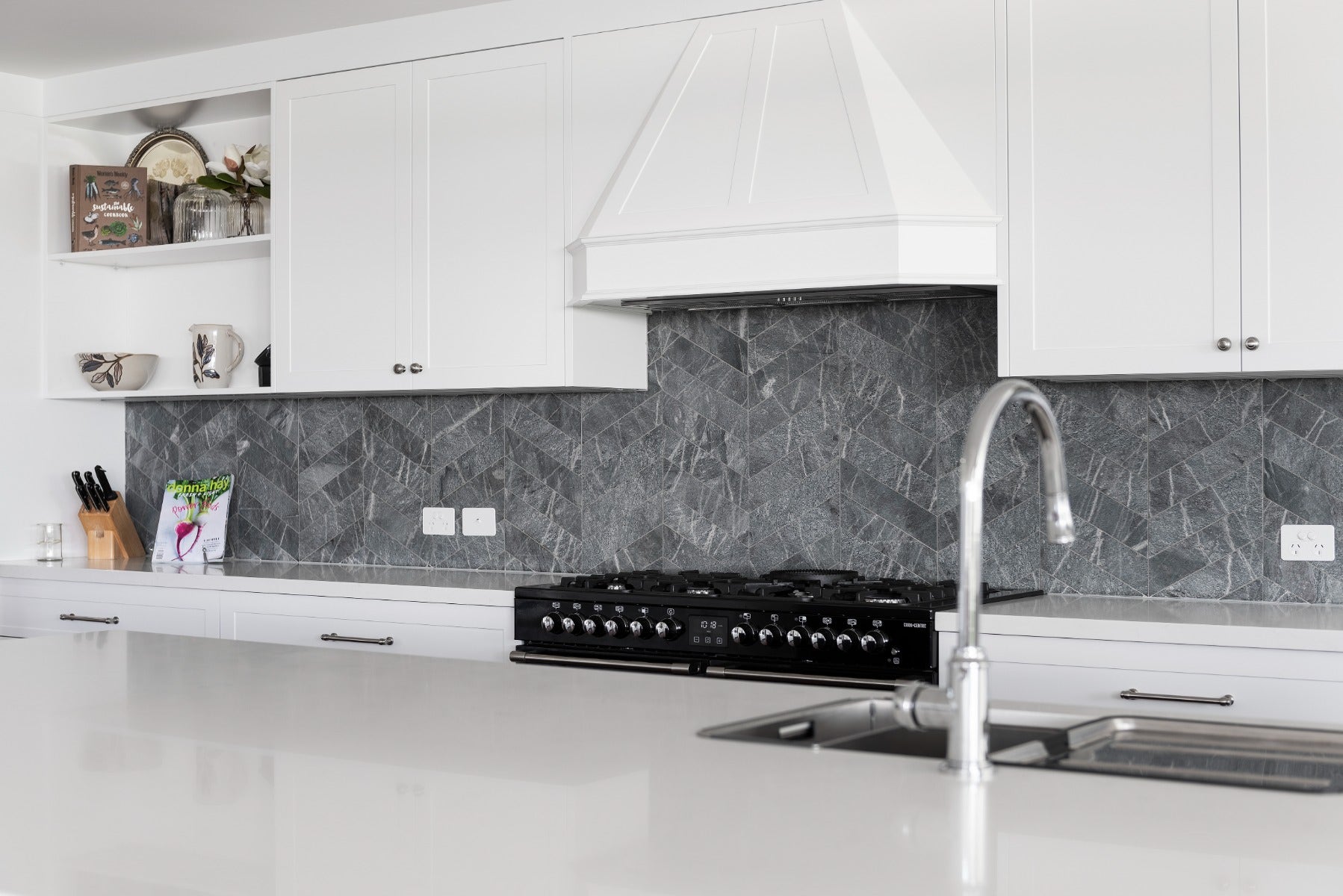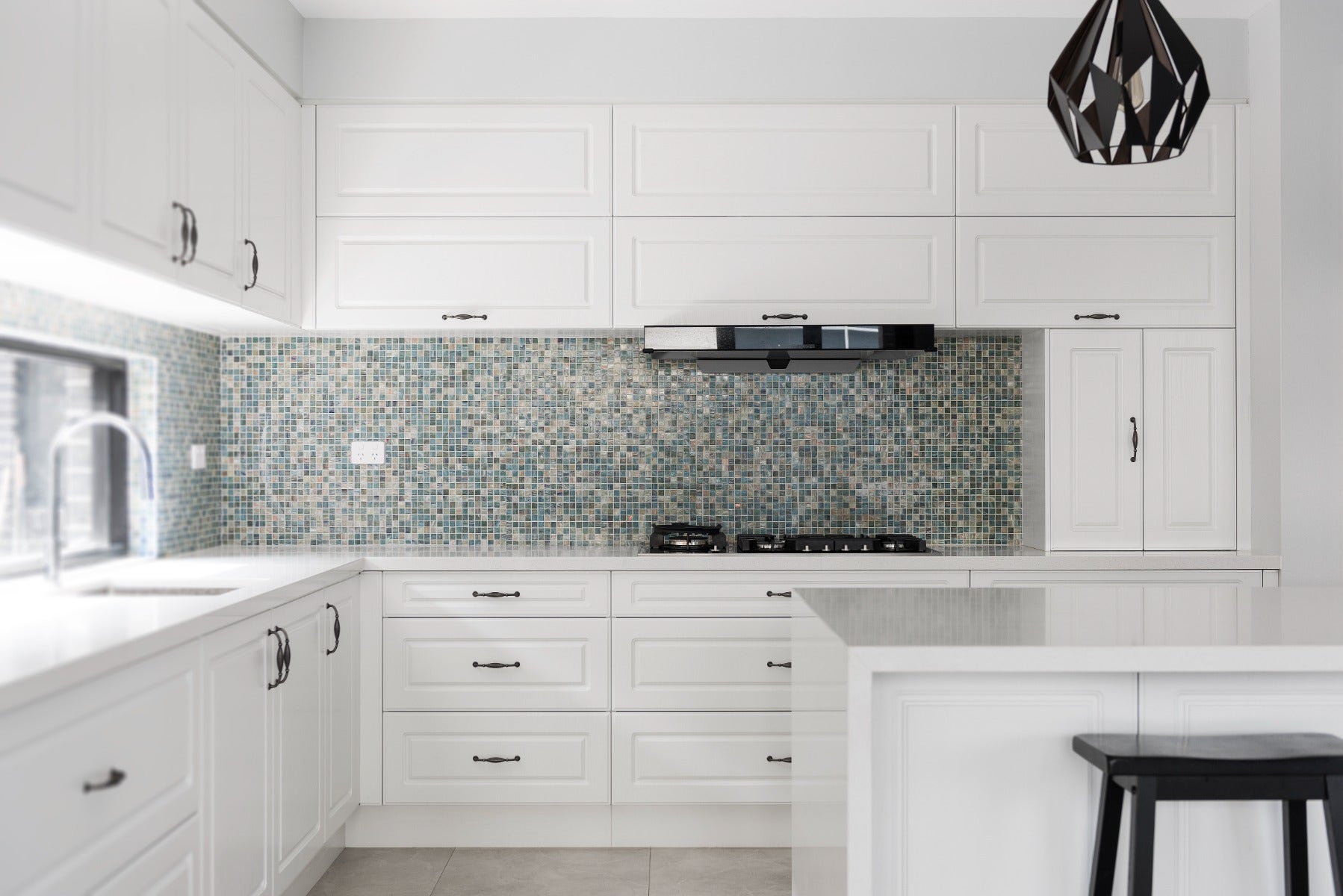Articles
How To Clean Kitchen Tiles
07.11.24
The Ultimate Guide to Cleaning Kitchen Tiles
The kitchen is the heart of the home, but all that cooking and foot traffic can really make your tiles grimy and stained. Keeping them clean isn’t just about looks; it’s crucial for creating a healthy and hygienic space where you whip up meals for your family.
Different tiles require different care. Using the right methods and products for each type can help prevent damage and keep them looking new. Whether it's quick daily cleaning or tackling tough grout stains, knowing how to care for your tiles makes all the difference.
In this guide, we'll share easy tips and best practices to learn how to clean kitchen tiles safely and effectively.
Get ready to enjoy a sparkling kitchen that’s both beautiful and sanitary!
Understanding Your Tile Material
To keep your kitchen tiles looking great, it’s important to know the material they’re made from.
Whether you have ceramic, porcelain, natural stone, or glass tiles, each type has its own unique properties and care needs.
With this know-how, you'll be armed to pick the perfect cleaning methods and products.
Ceramic and Porcelain Tiles
Ceramic and porcelain tiles are popular choices for kitchens due to their durability and versatility. They are generally easy to clean and maintain, but specific cleaning methods may vary depending on the finish.
Basic cleaning tips:
- Use a mild cleaner and warm water for regular cleaning.
- Scrub gently with a soft-bristled brush or non-abrasive sponge.
- Avoid harsh chemicals and abrasive cleaners that can damage the finish.

Natural Stone Tiles
Natural stone tiles, such as marble, granite, and travertine, add a luxurious and timeless touch to any kitchen. However, they require special care to maintain their beauty and prevent damage.
Sensitivities:
- Natural stone can be susceptible to stains, etching, and discolouration if not properly sealed and cared for.
- Some stones may be more porous than others, requiring more frequent sealing.
Specific care instructions:
- Use a pH-neutral cleaner and warm water.
- Avoid acidic cleaners, such as vinegar or lemon juice, as they can etch the surface.
- Use coasters and trivets to prevent water rings and stains.

Glass Tiles
Glass tiles offer a sleek and modern look for kitchens. They are relatively easy to clean but require some precautions to prevent scratches and damage.
Precautions:
- Avoid using abrasive cleaners or harsh chemicals.
- Use a soft cloth or sponge to clean the surface.
- Be careful when using sharp objects near the tiles to avoid scratching.
- Consider using a protective sealant to enhance durability and make cleaning easier.

Step-by-Step Cleaning Process
Daily Maintenance
Make a quick daily cleaning routine part of your schedule for a kitchen that sparkles!
A few minutes each day can keep your tiles looking their absolute best.
- Wipe down surfaces: After each meal, take a moment to thoroughly wipe down countertops, backsplashes, and floors using a damp cloth or mop. This not only keeps surfaces clean but also helps to eliminate any lingering food particles or bacteria that could cause odours or attract pests.
- Clean spills promptly: Address spills immediately. Use a suitable cleaning solution to tackle the mess, as this will help prevent stains from setting in and avoid the buildup of grime over time. A quick response can save you a lot of effort later.
- Sweep or vacuum regularly: Make it a habit to sweep or vacuum the floor regularly to remove dirt, debris, and crumbs. This will keep your space looking tidy and protect your tiles from scratches caused by small particles. Aim for at least once a week, or more frequently in high-traffic areas, to maintain a clean and welcoming environment.
Deep Cleaning
Deep cleaning your kitchen tiles is a must!
Regularly tackling this task eliminates stubborn dirt and keeps your tiles looking their best. Let's make your kitchen shine!
- Recommended frequency: It's ideal to deep clean your kitchen tiles once a week or every other week, depending on how often the kitchen is used and the amount of foot traffic it receives. Regular cleaning helps maintain hygiene and prevents the buildup of grime.
- Products: When selecting cleaning products, opt for a mild detergent or an all-purpose cleaner that is specifically formulated for your tile’s surface. These products are gentle enough to clean effectively without damaging the tiles or grout.
Techniques:
- To tackle tough stains on the tiles, use a non-abrasive sponge. This will help lift stains without scratching or damaging the tile surface.
- Don’t forget to pay close attention to corners and crevices, as these areas tend to accumulate dirt and debris over time. Using a small soft-bristled brush can help you reach these tight spaces effectively. Regularly cleaning these spots will provide a thorough, deep clean.
Natural Cleaning Solutions
If you love eco-friendly choices for a clean and fresh home, why not try natural cleaning solutions?
They’re not just effective; they’re also safe for the environment, leaving your space sparkling without the harsh chemicals!
- Vinegar: Fill the spray bottle with equal parts white vinegar and water. This powerful solution is great for cleaning tiles and grout, as it helps to break down mineral deposits and kill bacteria, leaving surfaces sparkling clean. (not suitable for natural stone tiles)
- Baking soda: Pour a small amount of baking soda into a bowl and slowly add water to the baking soda, stirring until it forms a thick paste. The consistency should be similar to toothpaste. This versatile cleaner is excellent for scrubbing away tough stains and deodorising them in the process.
- Lemon juice: Combine equal parts lemon juice and water in a spray bottle, and spray the mixture onto the grimy areas of your kitchen tiles. Allow the lemon juice solution to sit for a few minutes to penetrate the grime. Use a soft-bristled brush or a non-abrasive sponge to scrub the tiles. Rinse the tiles thoroughly with warm water.
CAUTION: Make sure the solution you choose is suitable for your tile, as some natural options can damage certain surfaces.
Tips for Preventing Tile Damage
Keep your kitchen tiles looking fabulous and lasting longer with these essential tips!
- Avoid harsh chemicals: Harsh chemicals can strip the finish of your tiles and cause discolouration or damage. Stick to mild cleaners or natural cleaning solutions.
- Use proper tools: Choose microfibre mops, soft-bristled brushes or non-abrasive sponges to avoid scratching the tile surfaces.
- Protect floors from heavy furniture: Use felt pads under chairs and furniture legs to create a protective barrier, preventing scratches and making it easier to slide items when rearranging. Regularly check and replace these pads, as they wear down over time, ensuring ongoing protection for your floors.
Maintaining Grout Health
Grout can easily fall victim to stains and discolouration over time. With a little TLC, however, you can keep your grout looking pristine and vibrant!
- Importance of sealing grout: Applying grout sealant creates a protective barrier that helps prevent stains and moisture from penetrating. Regular sealing can extend the life of your grout and make cleaning easier.
How to clean and whiten grout effectively:
- Use a grout cleaner specifically formulated for your grout type.
- Follow the instructions on the product label.
- Scrub gently with a grout brush.
- For stubborn stains or discolouration, consider using a bleach-based grout cleaner.
- Rinse thoroughly with clean water.
By following these simple maintenance and cleaning tips, you can keep your surfaces looking beautiful and improve both their appearance and functionality.
FAQs About How to Clean Kitchen Tiles
What is the best thing to clean kitchen tiles with?
The most effective way to clean kitchen tiles is by using a mixture of warm water and mild pH-neutral cleaner. This gentle yet powerful solution works wonders in lifting dirt and grime from tile surfaces. Regularly using this method can help maintain the appearance and longevity of your kitchen tiles.
How do professionals clean tiles?
Professionals often use steam cleaning machines or specialised tile and grout cleaners to deep clean tiles. They may also use high-pressure water jets to blast away tough stains and build-up.
Can vinegar damage tile surfaces?
While vinegar is a natural cleaning agent, it can be too acidic for some tile surfaces and grout. It is best to test a small area first before using vinegar as a cleaner.
What is the best way to clean tile grout?
How to clean kitchen tile grout: A simple way is to mix baking soda and water into a paste. Apply this paste to the grout lines and let it sit for 10-15 minutes to help lift stains. Then, use an old toothbrush or a soft-bristle brush to scrub the grout, getting into the crevices. Rinse the area with warm water to wash away any residue.
Keep Your Kitchen Tiles Sparkling Clean: Easy Steps for a Fresh Look
Here's a recap of how to clean kitchen tiles: Clean up any spills immediately. A gentle solution of warm water and a mild cleaner works wonders to keep them sparkling clean. Always use non-abrasive mops or sponges to avoid scratching the surface. For grout, a baking soda paste effectively tackles stains and deodorises the area.
Regular maintenance is key to preserving the look and longevity of your tiles, so incorporating these cleaning methods into your routine will help keep your kitchen fresh and inviting.
Ready to take your tile cleaning game to the next level?
Check out Amber’s amazing tile care products designed to keep your surfaces looking spotless!
And if you're looking to refresh your kitchen, why not schedule a design consultation?
Let’s make your space as inviting as it deserves to be!

